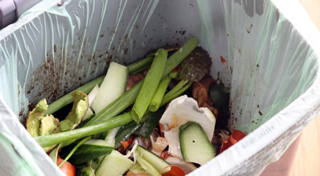Food Waste Recycling

From 2026 onwards, Councils in England will be carrying out weekly food waste collections from all households. This is a new legal requirement introduced by the Government under the new Simpler Recycling Reforms.
Why are food waste collections being introduced?
Unfortunately, households in the UK throw away a lot of food. Currently, 60% of household food waste in the UK is wasted. That’s around 4.7 million tonnes of food being thrown away every year, that could have been eaten, or recycled and used for other purposes.
Wasting food not only costs us all financially, but it wastes energy used in the production, processing, packaging and transporting of food, which impacts on the environment and climate change.
Reduce food waste and save money
Preventing food waste is best. In the UK households throw away around £17 billion of food a year which could have been eaten. The means that an average household spends £600 a year on food that is thrown away.
For advice and handy tips for reducing food waste, visit the Love Food, Hate Waste website - see the link in the related links column (on the right hand side on a desktop computer and at the bottom of this page if you are on a mobile phone).
Benefits of collecting food waste
Collecting food waste separately helps to:
- Reduce damaging greenhouse gas emissions by removing food waste from black bin waste
- Meet national recycling and circular economy targets
- Reduce waste disposal costs (food waste within the black bin costs a lot more to dispose of compared to recycling food waste)
- Generate a biogas used to make renewable heat and power
- Produce a bio-fertiliser for use in agriculture.
When will the food waste collections start?
Food waste collections will start mid-2026. Collections will be every week. More information will be provided to households across South Derbyshire later this year.
How will food waste be collected?
For a number of years now, residents in South Derbyshire have been able to dispose of some food waste in their garden bins. Soon, food waste must be separated and must NOT go into the garden bins.
All households will be given a brown kerbside caddy (23 litre), which will be emptied weekly by the refuse crews.
What food waste will go in the caddies?
- Meal leftovers
- Plate scrapings
- Meat - raw and cooked, bones
- Eggs including eggshells
- Dairy products like cheese and yogurts
- Bread, cakes and other baked goods
- Pasta and rice
- Beans and pulses
- Fish/shellfish - raw and cooked, including bones and shells
- Fruit - raw and cooked
- Vegetable peelings
- Salad and vegetables - raw and cooked
- Tea bags (including the bag) and coffee grounds
- Lard and other hard fats
- Pet food.
What should NOT go in the food waste caddies?
- Packaging of any sort
- Plastic bags or plastic film
- Liquids
- Cardboard
- Foil
- Glass
- Other recycling and waste
- Garden waste.
Do I line my food waste caddy?
YES. Ensure you wrap all food waste that goes into your caddy.
You can line your caddy with newspaper, a sheet of kitchen roll or a bag (plastic, paper or compostable) and this will help contain the food waste, just as you would with general waste.
All liners are mechanically separated from the food waste and are then recycled or converted into energy from a waste plant.
IDEA! If you line your caddy with a bag, then why not reuse an old cereal or bread bag to give it a second use - you don't need to buy separate compostable liners for your caddy.
What will happen to the food waste collected?
The food waste will be collected in special vehicles and taken to an anaerobic digestion facility. Here the food waste will be fed into a sealed digestor where it is slowly mixed and the food waste broken down by micro-organisms in the absence of air. This process will produce a biogas used to create heat and power and a bio-fertiliser for use in agriculture.
Worth a watch!
There is a great video to watch, to find out more about what happens to food waste when it is collected. It looks at the weekly collections that have already been taking place in other parts of the country, such as in Bath and Somerset. The video, produced by GENeco, can be found in the related links column (on the right hand side on a desktop computer and at the bottom of this page if you are on a mobile phone).
